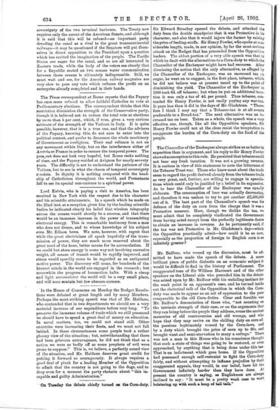Mr. Balfour, who wound up the discussion, must be ad-
mitted to have made the speech of the debate. A more brilliant piece of public dialectic on an economic subject it would be difficult to find in the history of Parliament. The exaggerated tone of Sir William Harcourt and of the other speakers on the Liberal side who preceded him in the debate was seized upon by Mr. Balfour with his unfailing instinct for the weak point in an opponent's case, and he turned inside out the rhetorical talk of the Opposition in which the Corn- duty was made to appear as an act of oppression to the poor comparable to the old Corn-duties. Clear and forcible was Mr. Balfour's denunciation of those who, "not counting on the intrinsic strength of their case, or on the arguments that they can bring before the people they address, rouse the ancient memories of old controversies and old wrongs, and who hope that they may revive on the shilling duty on corn all the passions legitimately roused by the Corn-laws, and by a duty which brought the price of corn up to 80s. and brought want and semi-starvation to many a cottage." There was not a man in this House who in his conscience thought that such a state of things was going to be restored, or even approached, by anything that is being done under this tax- That is an indictment which goes home. If the Opposition had possessed enough self-restraint to fight the Corn-duty fairly, and without attempting to inflame prejudice by their exaggerated appeals, they would, in our belief, have hit the Government infinitely harder than they have done. At present the country is saying, as Englishmen are always inclined to say "It must be a pretty weak case to want bolstering up with such a heap of tall talk."


























































 Previous page
Previous page